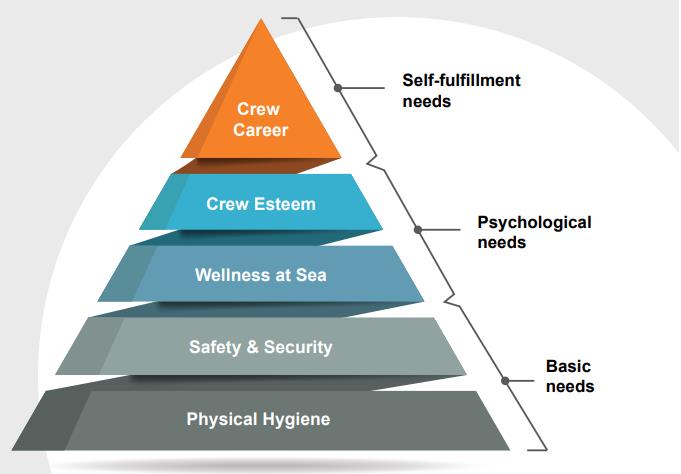Being far from home, away from people you care about, dealing with tough conditions and strict regulations; this is what it is to be a seafarer. But first, seafarers are people. Apart from taking care of their physical hygiene, they are dealing with the same fundamental problems as we do ashore – challenges, pain, stress and troubles – only some of the circumstances change.
In a psychological theory proposed by Abraham Maslow “physiology”, “safety”, “belonging and love”, “esteem”, “self-actualization”, and “self-transcendence” are terms used to describe the pattern that human motivations generally move through. Maslow’s hierarchy of needs is usually represented as a pyramid with the more basic needs at the bottom.
It is of essence for the crew members that are able to fulfill both their basic and psychological needs when onboard for which industry strives from a regulatory point of view (eg. ILO MLC 2006) and other considerable actions (eg. focus on safety culture, seafarer training, crew development, enhancing connectivity onboard)
Adapted on the basis of Maslow’s pyramid, the hierarchy of seafarer’s needs may be as follows:
- Physical Hygiene needs for acquiring decent working & living conditions on board are mainly addressed by ILO MLC.
- Safety & Security needs are addressed by industry’s regulatory framework (ILO MLC, ISM, ISPS and others) as well as actions toward safety culture implementation, extended training etc.
- Wellness at Sea needs are addressed by identifying Social, Emotional, Physical, Intellectual & Spiritual priorities.
- Crew Esteem needs are referred to the feeling of accomplishment, confidence and respect by others and may be realized by maintaining a healthy relationship with fellow crew members.
- Crew Career needs are realized by achieving each crew member self-awareness & self-fulfillment once the previous needs are fulfilled.

Simple ways to improve wellbeing onboard
- Be active and healthy: Maintaining a healthy diet and exercising can have significant benefits to seafarers’ health. It is important that crew members find an activity that they enjoy and make it part of their life onboard.
- Be more aware of the present moment: This step is referring to your thoughts and feelings, your body and the world around you. This step is called awareness “mindfulness”. It can positively change the way we feel about life and how we approach challenges.
- Keep learning: New skills can give seafarers a sense of achievement and even a new confidence. Books as well as internet onboard can be a seafarer “best friend” though!
- Give: It can be a smile, a thank you or a word. Larger acts, such as assisting your co-workers, can improve your mental wellbeing and help you build new social networks.
- Stay connected: Connect with people around you; spend time developing relationships rather than stay alone in your free time onboard. Furthermore, keep in touch with your relatives and friends when possible.
Connectivity now vital to seafarer happiness
Although there is no unanimous verdict about whether improved connectivity is ‘good’ or ‘bad’ for seafarers’ mental health and social interactions onboard ship, there are signs that improved connectivity onboard is generally beneficial. Technology is often linked to issues such as distraction, narcissism, expectation of instant gratification and even depression.
However, help might actually come from technology; depending always by the way it is dealt with, and not the fact that it currently has a strong presence in our everyday lives. Of course, shipping industry should not fail to invest in seafarers’ access to digital technology on the basis that doing so is detrimental to the wellbeing of the crew.






























































